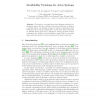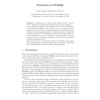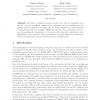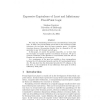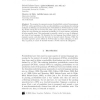207
click to vote
CONCUR
2012
Springer
13 years 4 months ago
2012
Springer
We introduce a nominal actor-based language and study its expressive power. We have identified the presence/absence of fields as a relevant feature: the dynamic creation of names...
236
click to vote
AMW
2011
14 years 5 months ago
2011
Subqueries are a poweful feature which allows to enforce reuse, composition, rewriting and optimization in a query language. In this paper we perform a comprehensive study of the i...
145
click to vote
NDJFL
2010
14 years 8 months ago
2010
The question of the origin of polyadic expressivity is explored and the results are brought to bear on Bertrand Russell's 1903 theory of denoting concepts, which is the main o...
167
click to vote
MST
2011
14 years 9 months ago
2011
: We define a weighted monadic second order logic for unranked trees and the concept of weighted unranked tree automata, and we investigate the expressive power of these two conce...
119
click to vote
LICS
2010
IEEE
15 years 14 days ago
2010
IEEE
A synchronization is a mechanism allowing two or more processes to perform actions at the same time. We study the expressive power of synchronizations gathering more and more proc...
143
click to vote
LATA
2010
Springer
15 years 14 days ago
2010
Springer
We apply language theory to compare the expressive power of models that extend Petri nets with features like colored tokens and/or whole place operations. Specifically, we conside...
159
click to vote
CI
2000
15 years 1 months ago
2000
Kowalski and Sergot's Event Calculus (EC) is a simple temporal formalism that, given a set of event occurrences, derives the maximal validity intervals (MVIs) over which prop...
135
click to vote
APAL
2004
15 years 1 months ago
2004
We study the relationship between least and inflationary fixed-point logic. In 1986, Gurevich and Shelah proved that in the restriction to finite structures, the two logics have t...
127
click to vote
IANDC
2007
15 years 2 months ago
2007
We investigate the complexity and expressive power of a spatial logic for reasoning about graphs. This logic was previously introduced by Cardelli, Gardner and Ghelli, and provide...
153
click to vote
JOLLI
2006
15 years 2 months ago
2006
We examine the expressive power of probabilistic context free grammars (PCFGs), with a special focus on the use of probabilities as a mechanism for reducing ambiguity by filtering ...
